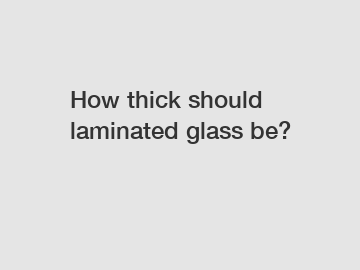How thick should laminated glass be?
How thick should laminated glass be? The thickness of laminated glass usually depends on the specific application and the level of safety required. In general, for standard applications such as windows and doors, laminated glass is typically 6.38 mm (1/4 inch) thick, consisting of two layers of glass with a 0.38 mm (0.015 inch) interlayer of polyvinyl butyral (PVB) sandwiched in between. However, for high-security applications or areas with stricter safety regulations, thicker laminated glass may be necessary.
When determining the thickness of laminated glass for a particular project, it is important to consider factors such as the size of the glass panels, the height of the installation, the level of wind load and impact resistance required, and any specific safety regulations that need to be met. Thicker glass is generally more resistant to breakage and provides greater protection against forced entry, natural disasters, and ballistic impact.
In addition to thickness, the type of interlayer used in laminated glass also plays a role in determining the safety and performance of the glass. PVB is the most common interlayer material used in laminated glass, providing excellent adhesion between the glass layers and flexibility to absorb impacts. However, for applications requiring higher levels of security, specialty interlayers such as SentryGlas® or Trosifol® may be used to provide enhanced strength and protection.

Can Tempered Glass Be Customized to Size?
Ultimate Guide to Choosing the Best Aluminium Window Door Profile
Discover the Top Benefits of SGP Laminated Glass for Enhanced Safety
7 Stunning Glass Guardrail Designs You Need!
Ultimate Guide to Insulated Window Panels
Why white painted glass is trending now
Insulated Glass Panels, Custom Double Pane Window ...
The thickness of laminated glass can also impact sound insulation and thermal performance. Thicker glass with a larger air space between the panels can provide better sound insulation and reduce heat transfer, making it ideal for buildings located in noisy or extreme climates. Additionally, thicker laminated glass may offer improved UV protection, reducing the risk of fading and sun damage to interior furnishings.
Overall, the thickness of laminated glass should be carefully chosen based on the specific requirements of the project to ensure optimal safety, performance, and longevity. By considering factors such as application, safety regulations, and environmental conditions, architects and designers can select the most appropriate thickness of laminated glass to meet their needs and provide peace of mind for building occupants.
Contact us to discuss your requirements of double insulated tempered glass, heat strengthen glass, custom silk screen glass. Our experienced sales team can help you identify the options that best suit your needs.
Additional resources:Ceramic Fritted Tempered Glass: The Future of Architecture Design?
How to Choose Smart PDLC Glass Film
Nano Coated Glass: A Revolution in Cleanliness?
What is the cost of laminated glass?
How much does laminated glass cost?
Exploring the Benefits of 16mm Laminated Glass
How To Order Tinted Glasses
Related Articles
-
Key Questions to Ask When Ordering ResinTranslucent Curtain Wall
-
Multi-Strand Coupler: The Ultimate Guide to Enhanced Performance
-
Are You Overpaying for Flanges? How to Ensure Competitive Pricing!
-
What is Biodegradable Trash Bags 5 Gallon and Why Do We Use Them?
4
0
0
-
Top Benefits of Choosing OEM Black Annealed Tie Wire Manufacturers
-
Tailored Solutions: Say Goodbye to Pipe Support Struggles with Heavy-Duty Custom Options!



Comments
0